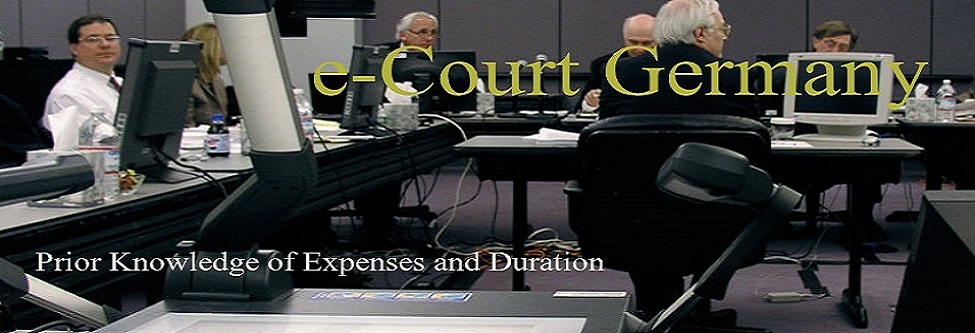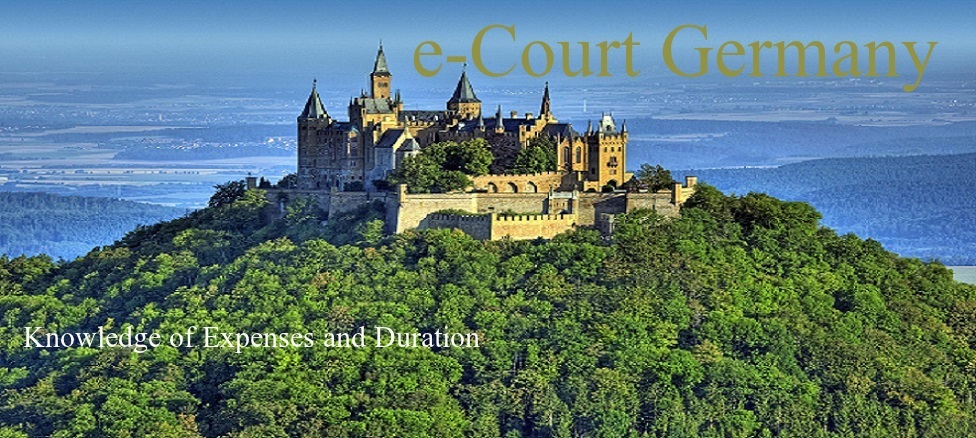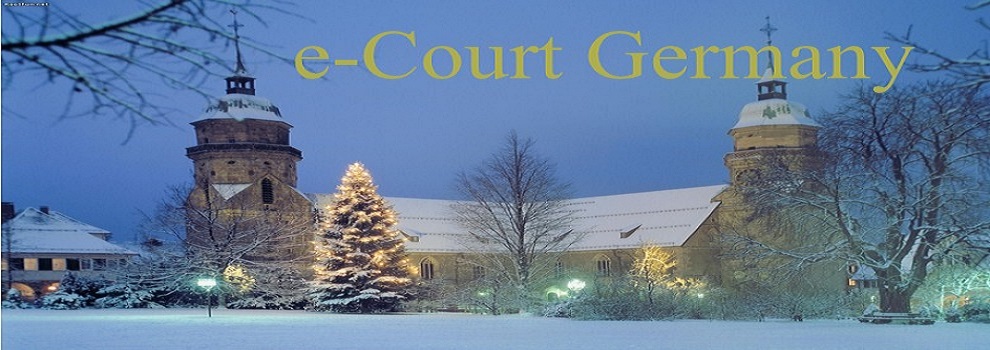With extrajudicial costs is meant that the 'winning' part will receive a compensatory amount ( whole or in part ) as payment for costs made prior to the e-Court procedure(s). Either party may prove these costs are conflict related and have indeed incurred as well that the party made attempts to settle the conflict between parties prior to going to seek litigation.
Costs incurred prior to the e-Court process

German Arbitration Focus
source : Alexander Demuth
In The European & Middle Eastern Arbitration Review 2011, Robert Hunter and Karl Pörnbacher of Hogan Lovells International LLP noted that the German courts have con- tinued to uphold the autonomy of arbitration as a means of dispute resolution replacing state courts, and are very hesitant to set aside an arbitral award. They said that this pro-arbitration approach is evident in a 2009 decision of the German Federal Court of Justice (BGH).
The BGH confirmed the arbitrability of disputes concerning the validity of a shareholder resolution in a limited liability company. The court thereby overturned its former decision in which the court had excluded the arbitrability of those disputes. Mr. Hunter and Mr. Pörnbacher noted: “The case gives reasons for the shift by stating the predominant majority opinion among scholars which has been developed since [the former decision]. The court also defines minimum standards that need to be fulfilled by the arbitra- tion clause to constitute a valid reference to arbitration for such disputes. First, the arbitral proceeding has to ensure that shareholders have the same quality of legal remedies as in state court proceedings. “Second, the quality of a decision of a state court as having validity among all other shareholders also has to be guaranteed in arbitration. (This requires all sharehold- ers to have access to the arbitration and give them the right to influence the process of appointing arbitrators.) “Third, all conflicts that might arise out of the dispute have to be heard at one tribunal.
In the original case the court did not deem those requirements fulfilled and in the end denied a defence for priority of arbitration.” Mr. Hunter and Mr. Pörnbacher added that a further point factoring into Germany’s pro-arbitration status relates to the country’s investment treaty programme – which has contributed to Germany’s economic success for more than half a century. By June 2010, Germany had signed 138 bilateral invest- ment treaties (BITs) which are characterised by progres- sive standards of investment protection. 130 of these are currently in force, making Germany the world leader in terms of the number of its BITs. Taken together with the EC and the OECD, Germany’s treaty regime provides an almost complete global network of international invest- ment protection.
Less contentious than litigation Alexander Demuth is a senior director at Alvarez & Marsal Dispute Analysis & Forensic Services GmbH. Since 1983, Alvarez & Marsal (A&M) has set the standard for helping organisations solve complex problems, boost performance and maximise value, and is home to more than 1,700 professionals in offices across North America, Europe, the Middle East, Asia and Latin America. A&M advises clients on commercial, financial and operational impacts of settlements in all forms of ADR, particularly when the parties will continue their relation- ship following the dispute – such as with joint-ventures and long-term contracts. According to Mr. Demuth, A&M offers global, cross- disciplinary teams with practical operational and indus- try expertise tailored to specific case needs. He noted: “We work quickly to deliver accurate and comprehensive results and to simplify complex concepts for courts, juries, arbitrators, mediators and regulators. In addition, A&M is free from audit-based conflicts- of-interest, and provides objective advice for each unique situation.” The German Institution of Arbitration (DIS) has gained a reputation in recent decades for handling cases in a smooth and speedy manner. An important feature of the DIS Arbitration Rules is the flexibility they offer – giving indi- vidual procedural agreements priority over any non-mandatory rules wherever possible. In 2010, the DIS published a new set of ADR rules to provide a wide choice of procedures to suit parties. These include: Conflict Management Rules, which provide parties with an institution- alised possibility to deal with the choice of the appropriate resolution instrument in a structured process with professional support; Rules for Expertise when the parties require a non-binding decision by a neutral person; and Expert Deter- mination Rules when the parties require a pre- liminary binding decision by a neutral person. Mr. Demuth noted that the number of proceed- ings under DIS rules have increased over time. Approximately 30% of DIS proceedings involve a foreign party, while approximately 20% are conducted in English – trends which are also growing. The most common areas for German arbitration include construction, contract and post-M&A disputes. He said: “Further, our experience is that arbi- tration is the preferred method for the settlement of business disputes in Germany. The reasons for this include DIS flexibility, confidentiality, and that arbitrations are usually less contentious than litigation. Additionally, arbitration allows for selection of arbitrators with more experience than courts with specific issues.”
International arbitration – increasing in popularity Bach, Langheid & Dallmayr is Germany’s largest law firm specialised on insurance and liability law only, and is celebrating its 100th anniversary this year. More than 100 lawyers work in four offices (Cologne, Munich, Frankfurt and Berlin). In addition, for several years, BLD has extended its international network in handling high profile cases. In co-operating with independent partners throughout Europe and in the US, BLD stays in close contact with the international insurance market and different branches in the industry. According to Dr. Martin Alexander, partner with the firm, international arbitration is becoming more and more popular – especially in cross-border product liability cases. With a team of more than 25 lawyers specialised on liability matters, BLD is able to handle larger cases which are mostly coming from the automotive, life-sci- ence, medical-devices, pharma and foodstuff sectors. Dr. Alexander noted that, crucially, BLD is familiar with the latest development in German and European case law as well as the latest regu- lations and laws in all field of product liability. He said of the changing shape of the arbitra- tion industry: “The United Nations Convention on Contracts for the international Sale of Goods (CISG) has more been applicable than the Ger- man Civil Code (BGB) to our recent German arbitration cases. This demonstrates how the international flow of goods (i.e. production in China, Eastern Europe i.e.) has its effects on the applicable law, and also shows that the CISG is getting more popular. “Since parties tend to distrust stately courts at the contracting partner’s seat, arbitration itself is becoming increasingly popular – especially since proceedings can be held in English or in another language the parties agree upon.” Dr. Alexander concluded: “Further, despite recent economic tumult, the downturn had quite the opposite effect on BLD. Many cases, especially between system supplier and OEM in the automotive sector, were fought out in court – and these are matters which would have been settled without arbitration previously.”
-
TOPICS:
- ABOUT e-COURT
- home
- preliminary information
- introduction ( About us )
- benefits
- scope of legal areas
- directorate
- supervisory board
- advisory council
- originating partners
- e-Court & ADRpartners
- articles of operation
- privacy
- legal information
- in the news
- ( e-Court versus ADR )
- COSTS
- *** introduction
- *** membership
- *** court fee
- *** escrow
- *** hearings costs
- *** attestation costs
- *** extrajudicial costs
- *** legal counsel fees
- *** subsequent costs
- frequently answered questions
- OFFLINE NETWORKING
Endorsements ( 1/2000 + ):
- Patricia M. Swerhone
Waters and Associates, Barristers & Solicitors, Toronto - Kenneth J. Byrne
Immigration and Real Estate Lawyer at Benson Buffett, Newfoundland And Labrador - Aitken Robertson
Owner/Lawyer at Aitken Robertson - Nathan B.
Criminal Defense Lawyer at Aitken Robertson - Tony Baker
Toronto, Ontario, Legal Area Law Practice - Anatoly D
Founder & Partner at D2Law LLP, Toronto - Adair
Morse LLP
John Adair, Toronto, Canada Area Law Practice - Bart
Law
- Leo Adler
Osgoode Hall Law School - Steven Bookman
Osgoode Hall Law School - Amy M. Crosbie
Partner at Curtis, Dawe, Newfoundland And Labrador - Justice Clark
Partner at Simmons Da Silva + Sinton LLP, Toronto - Stanley Potter
Owner, Stanley J. Potter, Barrister & Solicitor, Toronto - Justice Clark
Partner at Simmons Da Silva + Sinton LLP, Toronto - Stanley Potter
Owner, Stanley J. Potter, Barrister & Solicitor, Toronto - Beth A. Sheppard
Shareholder/Director, Benson Buffett PLC Inc., Newfoundland And Labrador - Tony Lafazanis
Personal injury lawyer at Tony Lafazanis, Toronto, - Steve A.
Lawyer at Defend Your Points - Traffic Ticket Lawyers, Toronto - ( Endorsements continued.....)















